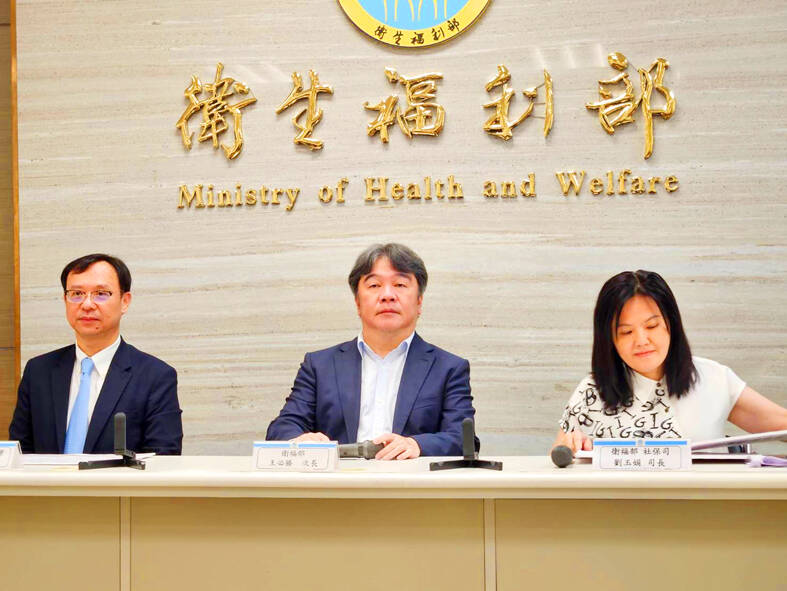The National Health Insurance Administration (NHIA) plans to set up a specialized office to speed up the process of adding new drugs to National Health Insurance (NHI) coverage, administration Director-General Shih Chung-liang (石崇良) said yesterday.
As new drugs are being developed that are relatively expensive, several medical welfare groups and patients’ associations, including the Formosa Cancer Foundation and Taiwan Young Patient Association, have urged the government to set up a special fund to help cover medical expenses for the new drugs and speed up the NHI coverage review process.
The groups have said it takes about two years for new cancer drugs to be assessed and included in the list of drugs covered by the NHI.

Photo: CNA
New drugs currently need to pass a review and obtain a drug license from the Food and Drug Administration (FDA) before applying to the administration for NHI coverage.
Shi said the specialized office would speed up the review of new drugs — especially those for unmet medical needs, breakthrough therapies, or which have a longer-lasting effect and can replace current drugs.
Hopefully the office would start operating in January next year, he said, adding that its main functions would be to conduct health technology assessments of new drugs, gather clinical data on new drugs that are temporarily covered by the NHI for future assessment, database management and training personnel to assist drug companies in providing the correct information in their report.
The proposed budget for the office is NT$100 million (US$3.14 million) for the first year, and the number of office personnel would be expanded from eight administrative personnel at present to about 100, including specialists in health economics, statistics and database management, Shi said.
With the FDA and the office reviewing the drugs simultaneously, the goal is to reduce the process to one year, he said.
As the office would be handling sensitive personal information when gathering clinical data, the next phase should be to establish an administrative agency, similar to the British National Institute for Health and Care Excellence, but legislation would be required for that, which would take about three to four years, Shi said,
As the UK has the Cancer Drugs Fund and the Innovative Medicines Fund, which provide interim funding for patients to gain access to promising new drugs faster, the administration also hopes to set up a new fund for drugs that is separate from the NHI global budget, Shi said
He said about 80 percent of the new drugs funded by the Innovative Medicines Fund later passed review and were covered by the British National Health Service, so the new drugs fund could cover new drugs where some uncertainties remain regarding their therapeutic effects, and further data and assessment is required.

A preclearance service to facilitate entry for people traveling to select airports in Japan would be available from Thursday next week to Feb. 25 at Taiwan Taoyuan International Airport, Taoyuan International Airport Corp (TIAC) said on Tuesday. The service was first made available to Taiwanese travelers throughout the winter vacation of 2024 and during the Lunar New Year holiday. In addition to flights to the Japanese cities of Hakodate, Asahikawa, Akita, Sendai, Niigata, Okayama, Takamatsu, Kumamoto and Kagoshima, the service would be available to travelers to Kobe and Oita. The service can be accessed by passengers of 15 flight routes operated by

GIVE AND TAKE: Blood demand continues to rise each year, while fewer young donors are available due to the nation’s falling birthrate, a doctor said Blood donors can redeem points earned from donations to obtain limited edition Formosan black bear travel mugs, the Kaohsiung Blood Center said yesterday, as it announced a goal of stocking 20,000 units of blood prior to the Lunar New Year. The last month of the lunar year is National Blood Donation Month, when local centers seek to stockpile blood for use during the Lunar New Year holiday. The blood demand in southern Taiwan — including Tainan and Kaohsiung, as well as Chiayi, Pingtung, Penghu and Taitung counties — is about 2,000 units per day, the center said. The donation campaign aims to boost

ENHANCING EFFICIENCY: The apron can accommodate 16 airplanes overnight at Taoyuan airport while work on the third runway continues, the transport minister said A new temporary overnight parking apron at Taiwan Taoyuan International Airport is to start operating on Friday next week to boost operational efficiency while the third runway is being constructed, the Ministry of Transportation and Communications said yesterday. The apron — one of the crucial projects in the construction of the third runway — can accommodate 16 aircraft overnight at the nation’s largest international airport, Minister of Transportation and Communications Chen Shih-kai (陳世凱) told reporters while inspecting the new facility yesterday morning. Aside from providing the airport operator with greater flexibility in aircraft parking during the third runway construction,

American climber Alex Honnold is to attempt a free climb of Taipei 101 today at 9am, with traffic closures around the skyscraper. To accommodate the climb attempt and filming, the Taipei Department of Transportation said traffic controls would be enforced around the Taipei 101 area. If weather conditions delay the climb, the restrictions would be pushed back to tomorrow. Traffic controls would be in place today from 7am to 11am around the Taipei 101 area, the department said. Songzhi Road would be fully closed in both directions between Songlian Road and Xinyi Road Sec 5, it said, adding that bidirectional traffic controls would